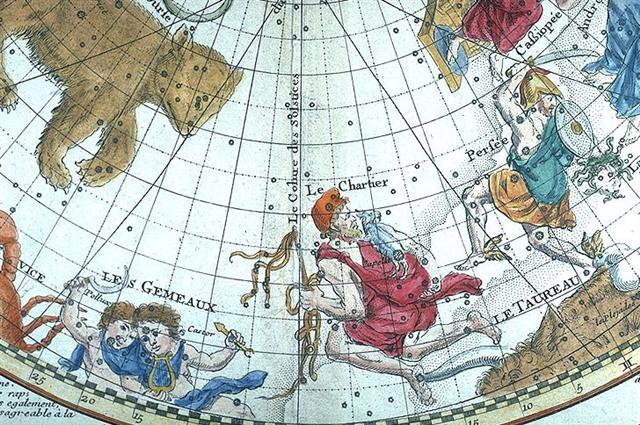Canopus was rising heliacally in June 25 and we can correlate this other great star - which is next to Sirius in brightness - with the pyramid of Khafre:
For the 'Menkaure' glyph (Ca4-13, where 41 * 3 = 123) I suggest the ruling star could be Praja-pāti (δ Aurigae), although there were other great stars rising in June 18. ... δ, 4.1, yellow, is on the head of the Charioteer. It is unnamed with us, but, inconspicuous as it is, the Hindus called it Praja-pāti, the Lord of Created Beings, a title also and far more appropriately given to Orion and to Corvus. The Sūrya Siddhānta devotes considerable space to it; but 'why so faint and inconspicuous a star should be found among the few of which Hindu astronomers have taken particular notice is not easy to discover.' ... We can compare Praja-pāti with the benevolent Menkaure: ... Menkaure was allegedly a much more benevolent Pharaoh than his predecessors. According to legends related by Herodotus, he wrote the following: This Prince (Mycerinus) disapproved of the conduct of his father, reopened the temples and allowed the people, who were ground down to the lowest point of misery, to return to their occupations and to resume the practice of sacrifice. His justice in the decision of causes was beyond that of all the former kings. The Egyptians praise him in this respect more highly than any other monarchs, declaring that he not only gave his judgements with fairness, but also, when anyone was dissatisfied with his sentence, made compensation to him out of his own purse and thus pacified his anger. The Gods however ordained that Egypt should suffer tyrannical rulers for a hundred and fifty years according to this legend. Herodotus goes on: An oracle reached him from the town of Buto, which said 'six years only shalt thou live upon this earth, and in the seventh thou shalt end thy days'. Mycerinus, indignant, sent an angry message to the oracle, reproaching the god with his injustice - 'My father and uncle,' he said 'though they shut up the temples, took no thought of the gods and destroyed multitudes of men, nevertheless enjoyed a long life; I, who am pious, am to die soon!' There came in reply a second message from the oracle - 'for this very reason is thy life brought so quickly to a close - thou hast not done as it behoved thee. Egypt was fated to suffer affliction one hundred and fifty years - the two kings who preceded thee upon the throne understood this - thou hast not understood it'. Mycerinus, when this answer reached him, perceiving that his doom was fixed, had lamps prepared, which he lighted every day at eventime, and feasted and enjoyed himself unceasingly both day and night, moving about in the marsh-country and the woods, and visiting all the places he heard were agreeable sojourns. His wish was to prove the oracle false, by turning night into days and so living twelve years in the space of six ... His tyrannical pharaoh predecessors were rising heliacally later, but down in the Underworld they were earlier, with Khufu first, then Khafre, and Menkaure last. From June 18 to the end of the month there are 12 days. Or should we not rather say that in rongorongo times the number of 'years' from Sirius up to and including June 18 were 12.
|








